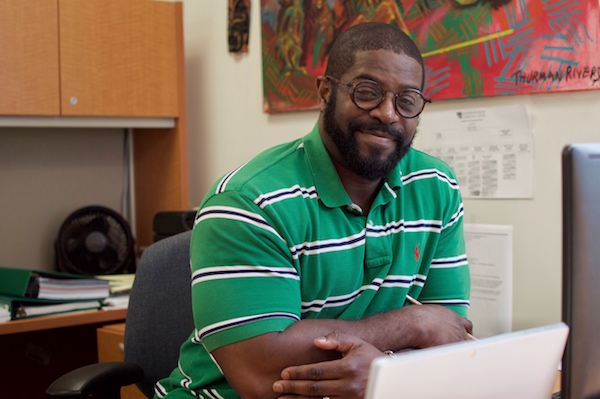
BY JACKSON CHEN | Nearly six months into his leadership, Roderick Jones is undertaking a major operational shift focused on the quality of the agency’s programs.
Jones, 47, became Goddard Riverside’s new executive director on February 13, returning to his native New York from a Missouri non-profit he led. He fills the shoes of Stephan Russo, who spent four decades at the agency’s helm. With close to a decade of experience at the Grace Hill Settlement House in St. Louis, Jones’ skills translate well into his new role at the Upper West Side institution located on Columbus Ave. and West 89th St.
In many ways, it was the call of the big city that drew him back, Jones explained.
“New York is a kind of place where there’s all the opportunity in the world to be as much or as little as you want to be,” he said. “If you’re rich or poor, black or white, or from some other culture, there’s a leveling that creates a comfort in a place that’s for everybody.”
Growing up in the New York City Housing Authority’s Cypress Hills Houses in Brooklyn, Jones was familiar with the city. But, he said, the city has evolved greatly since his youth, something he especially notes now that he makes the Upper West Side his home.
“One of the things that was so classic Brooklyn was that it was the home of the working Joe,” Jones said of Cypress Hills. “If you took the train or bus in Brooklyn, chances are they weren’t reading the Times, they were reading the Post.”
In his time back, Jones said, he has noticed the decline in the city’s livability and the effect of that on middle and working class New Yorkers. Earlier waves of homelessness, he said, resulted from the federal and local governments shuttering mental health institutions, but the threat of losing your home has crept into the lives of many families.
“Now you’re seeing more and more people that are the servers, who serve you in restaurants, the secretary, the custodian who cleans when you leave work for the night,” Jones said. “Those are the families that are unstable, who are now intermittently finding themselves on the streets because the cost of housing has risen greatly.”
To better the quality of life of New Yorkers he serves, Jones envisions a model of service delivery more quality-oriented. Instead of offering a glut of programs, the executive director said, he wants to instead examine the impact of the agency’s efforts.
“What do we need to do to ensure that we are producing transformational results in the lives of people?,” he explained of the questions he is asking.
His initial months, Jones said, have been a combination of self-adjustment and self-reflection. While acknowledging that he is still finding his rhythm and cadence as Goddard Riverside’s leader, he is focused on asking which of the agency’s programs have the most profound, lasting impact.
Goddard Riverside has even taken a back seat from being the lead agency of the Manhattan Outreach Consortium—a homeless outreach network comprised of itself, Breaking Ground, and the Center for Urban Community Services — to ensure its focus on program quality.
“If we’re talking about kids in our afterschool program, are the families getting the support they need so that their parents are getting GEDs while their kids are learning in school?,” Jones offered as an example. “That level of integration is really where we’re focused at, and that’s less about adding big programs as much as perfecting the work in the agency.”
One major hurdle Jones, like other social service providers, faces is the shaky future of federal funding. He said he confronted similar uncertainty as he took over at Grace Hill in the midst of the 2008 economic crisis.
Concerns about money from Washington are compounded, he said, by the way city contracts undervalue the services provided by up to 25 cents on the dollar.
The financial squeeze facing service providers like Goddard Riverside, Jones said, makes his examination of the agency’s strengths all the more timely.
“There’s a significant amount of uncertainty given the proposed cuts in public service support,” he said. “For us, our thinking about our work comes at a good time because ultimately we and many other not-for-profits will have to make substantial decisions about what we do and what we can commit ourselves to.”
As the man in charge, Jones said, he is prepared to steer Goddard Riverside into a brighter future where its programs ensure significant results for those it serves.
“I’ve learned a lot over the years about how to focus on what the ends are supposed to be and to be clear about both the mission and the margin,” he explained. “If you don’t have a margin, you just don’t have a mission, you just can’t do the work.”
Jones’ board believes his background is just what Goddard Riverside needs at this moment in its life.
“We are very fortunate to have Rod at the helm of the agency,” said Chris Auguste, the board’s chair. “Rod has 12 years of experience running settlement houses and brings with him that experience, the knowledge, and the compassion to successfully lead Goddard for many years.”































